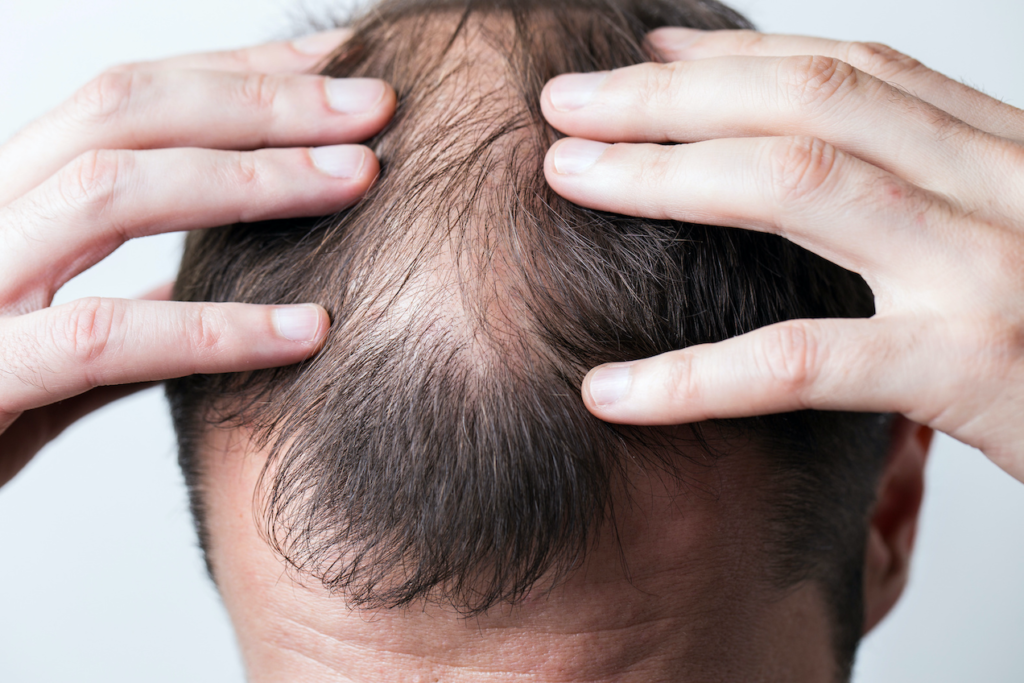By John Jesitus
In the billion-dollar business of oral hair-loss supplements, the evidence for the effectiveness of specific ingredients ranges from promising to nonexistent, according to a recent review.

Because OTC hair-growth supplements are easily available, said lead author Madeline J. Adelman, BS, patients with hair loss often turn to these products before consulting physicians. Ms. Adelman is a medical student at Wayne State University School of Medicine, Detroit. The review appeared online December 9, 2020, in the International Journal of Dermatology.
Because supplements are marketed as foods, not drugs, Ms. Adelman said, manufacturers need not prove their efficacy and safety before launching them in the marketplace. “There is so much false advertising, misinformation, and capitalization off patient vulnerability,” she said. Given this climate, she added, dermatologists must be aware of the safety and utility of these supplements to provide appropriate counseling to their patients. “It’s important to know what over-the-counters are out there, what works, and what is a waste of money,” she advised.
On a positive note, said Ms. Adelman, evidence for marine-derived formulations as complementary treatments is very promising. “While we don’t know exactly why marine-derived collagen affects hair, the clinical-trial data showing that these products have positive impacts on hair health is there,” she said. “AminoMar marine complex (Viviscal Limited) has the most data, with clinical trials showing statistically significant beneficial effects on multiple hair-loss conditions.”
A proprietary blend of shark and mollusk powder, AminoMar achieved significant improvements in studies of premenopausal women with subclinical hair thinning (n = 96), men with thinning hair (n = 60), and young men with hereditary androgenetic alopecia (n = 40). In the study of premenopausal women, actively treated patients experienced significantly less hair shedding and a statistically significant increase in mean vellus-like hair diameter at 3 months and 6 months. In hereditary androgenetic alopecia, actively treated patients experienced a mean 6-month increase in new non-vellus hair of 38.1%, vs 2.1% in the control group (P < 0.0001).
Additional AminoMar studies have demonstrated similar, statistically significant benefits for thinning hair in males and females, alopecia areata (AA) including alopecia totalis, and hereditary androgenetic alopecia.
In small studies, Synergen Complex (Nutrafol, Nutraceutical Wellness Inc.) and Marilex (Nourkrin, Glenmark Pharmaceuticals Ltd.) demonstrated significant improvements for women with self-perceived thinning hair and for men and women with hair loss of varying etiologies, respectively. In the 40-patient Synergen study, treated patients’ total, terminal, and vellus hair counts showed significant improvement at 3 months and 6 months. In the 55-patient Nourkrin study, the active group experienced an average hair growth increase of 35.7%, vs 1.5% for placebo. Actively treated patients also reported significantly higher satisfaction with treatment.
All 3 marine-derived supplements contain additional ingredients such as vitamins, minerals, horsetail extract, and ashwagandha. Therefore, authors suggest further investigating individual marine ingredients in larger prospective trials. “Since hair in general takes a long time to grow,” said Ms. Adelman, “longer studies with single-ingredient supplements (instead of cocktails) versus placebo would help tell us what actually works, for starters.
Plant- and marine-derived bioactive compounds have given us so much already and have great potential.
Plant- and marine-derived bioactive compounds have given us so much already and have great potential. Cytarabine, a chemotherapy drug, was inspired by nucleosides found in marine sponges.”
Unlike marine collagen, many ingredients marketed for hair loss have only in vitro or animal data—or none at all—behind them. Biotin, for instance, is one of the most heavily advertised hair-loss ingredients. “In just my limited time in dermatology clinics as a medical student,” said Ms. Adelman, “I’ve heard biotin, nutrition, and supplements being asked about so frequently with regard to hair health. Patients are taking and asking about these products. And while taking biotin is harmless, there is no published evidence supporting that oral biotin supplements promote hair growth in the absence of biotin deficiency.”
Additionally, no published evidence supports the utility of niacin, vitamin A, or vitamin D in addressing hair loss. Although low vitamin D levels have been associated with AA, telogen effluvium, and female-pattern hair loss, no evidence supports vitamin D monotherapy in treating these conditions.
Oral vitamin C has weak evidence (from animal and in vitro human-follicle studies) supporting its use as a hair-growth inducer. Modest evidence suggests that vitamin E can increase hair counts for patients with varying levels of hair loss, and that zinc can increase hair thickness in women with hair loss (although in a separate study, zinc had no impact on AA). Iron supplementation may help patients with possible iron deficiency, but evidence supporting oral use in all hair-loss patients is weak.
While ashwagandha, curcumin, capsaicin, and selenium lack evidence for treating hair loss, some evidence suggests that horsetail and methylsulfonylmethane may be effective complementary or alternative treatments to promote skin and hair health. Similarly, small studies have shown efficacy for saw palmetto (Serenoa repens) and pumpkinseed oil, but only in androgenetic alopecia.
Studies of hair growth and supplementation are generally limited by time and compliance. “It is much easier said than done to take a pill every day,” Ms. Adelman explained, “and it will take at least 3 to 6 months before there is a noticeable difference in [a patient’s] hair.”
REFERENCE
Adelman MJ, Bedford LM, Potts GA. Clinical efficacy of popular oral hair growth supplement ingredients [published online ahead of print, 2020 Dec 9]. Int J Dermatol. 2020;10.1111/ijd.15344. doi:10.1111/ijd.15344.
DISCLOSURES
Ms. Adelman reports no relevant conflicts of interest.


